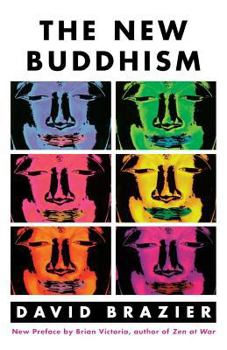The New Buddhism
Select Format
Select Condition 
Book Overview
This is a manifesto for a more active, compassionate, and socially engaged Buddhism-one grounded in the Buddha's original intention. The New Buddhism asserts that Buddha was a radical critic of society, and that his vision of a new social order transcended racial and economic divisions. Brazier takes a new look at many aspects of Buddhism and reinterprets them in light of the Buddha's social aims. Western and Eastern visions of enlightenment are juxtaposed,...
Format:Paperback
Language:English
ISBN:0312295189
ISBN13:9780312295189
Release Date:June 2002
Publisher:St. Martin's Griffin
Length:288 Pages
Weight:0.70 lbs.
Dimensions:0.7" x 5.5" x 8.5"
Customer Reviews
5 ratings
A clarion call for a more engaged Buddhism
Published by Thriftbooks.com User , 15 years ago
A provocative manifesto for a more active, compassionate, politically and socially engaged Buddhism. Brazier compellingly argues that Buddha was a radical critic of society, and that his vision of a new social order transcended racial and economic boundaries. He distinguishes between "extinction Buddhism" and "liberation Buddhism"---the former seeks to release the individual from the world, while the latter seeks to perfect the world by freeing it from the forces of greed, hatred and delusion. This book should be read not only by all Buddhists but by everyone enamored of Eastern religion and spirituality. It is an excellent critique of those dogmas urging us to renounce political concerns as an "illusion" which interferes with our spiritual development.
It was a call ...
Published by Thriftbooks.com User , 15 years ago
I felt the book as a call. It is a passionate description of a social view of the Buddha. It repeats the same concepts many times throughout the chapters ... but I think this is part of his style.
Rediscovering The Buddha
Published by Thriftbooks.com User , 18 years ago
David Brazier makes a fascinating case for the "lost mission" of the Buddha: Enlightenment is about waking up to reality so that we can set about making the world a better place for all living beings. Unfortunately, the emphasis of the Buddha's original teaching was distorted and buried by millenia of misinterpretation as the Dharma became "Buddhism" in its various incarnations. "The New Buddhism" is quite effective in raising crucial questions about what the Buddha was all about and offers ideas for putting the Buddha's message into practice as a way of life that is logical and beneficial. The purpose of awakening is not about sitting on cushions and purchasing trendy "Buddhist" accessories, nor is it about substituting one set of rituals for another; it is about making changes that promote healing and peace for all living beings through compassionate, logical action. "The New Buddhism" should be recommended reading for those interested in building a better world. It is in working for the good of all that we can change ourselves, and it is in working with ourselves that we can create a sane, peaceful and healthy world.
Historical Insights
Published by Thriftbooks.com User , 19 years ago
Brazier makes his case very well, starting with Buddha's own time & leading on down to our own. Bring an open mind to this read. I cannot look at the history of the Dharma's presentation the same way after this book!
Which Buddhism?
Published by Thriftbooks.com User , 22 years ago
This is both an intellectually stimulating and entertaining book by a revisionist author who is attempting to forge a new Buddhism for modern Western consumption. It certainly resonates with the Critical Buddhism movement that has been largely erupting in Japan over the last couple decades, and as such shares its strengths and weakness. See Hubbard's Pruning The Bodhi Tree for an overview of this. Being attached to this outlook, Brazier turns a rather skeptical eye to the history and doctrines that have been historically associated with Buddhism, overturning and casting out anything that doesn't fit into his agenda of socially engaged Buddhism. In the process, he turfs many positions that great numbers of Buddhists would think of as being core issues in Buddhist faith. To think that they can be as breezilly dismissed as Brazier handles them is a mistake. How much can be cut out before it's Buddhism in name only? In fact, which of the eight very different views of enlightenment he presents is really ultimate when they each claim to be and shoot down some or all of the others? And if there's so much allowable diversity, why not allow a New Buddhism, even if it comes close to being a Buddhist Brazierism? These are all questions worth hard thought, particularly for a religion without canon or (allegedly) dogma. Given that the Buddha welcomed all questions, however, and preached critical analysis, even of his own views, Brazier has stirred up a tasty pot of issues for thinking Buddhists. Whether you end up agreeing or disagreeing with him, this is one of the most provocative books about Buddhism around.






